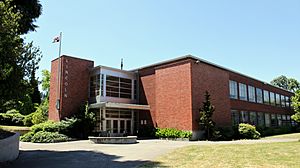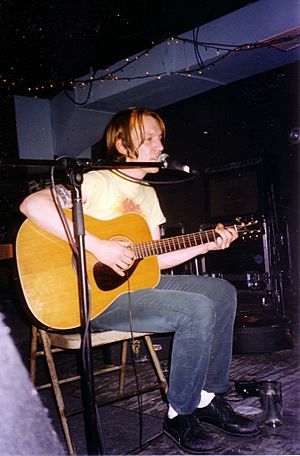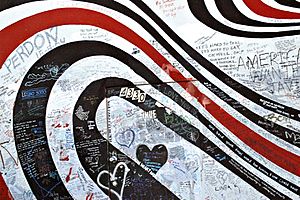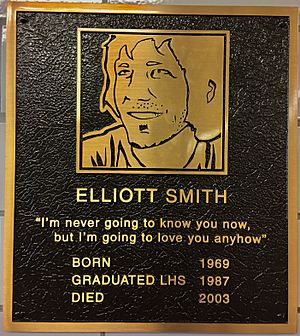Elliott Smith facts for kids
Quick facts for kids
Elliott Smith
|
|
|---|---|
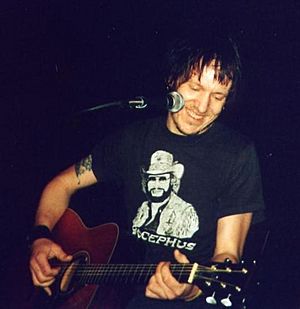
Smith performing in 2003
|
|
| Background information | |
| Birth name | Steven Paul Smith |
| Born | August 6, 1969 Omaha, Nebraska, U.S. |
| Origin | Portland, Oregon, U.S. |
| Died | October 21, 2003 (aged 34) Los Angeles, California, U.S. |
| Genres |
|
| Occupation(s) |
|
| Instruments |
|
| Years active | 1991–2003 |
| Associated acts |
|
Steven Paul Smith (August 6, 1969 – October 21, 2003), known professionally as Elliott Smith, was an American singer-songwriter and multi-instrumentalist. Smith was born in Omaha, Nebraska, raised primarily in Texas, and lived much of his life in Portland, Oregon, where he gained popularity. Smith's primary instrument was the guitar, though he also played piano, clarinet, bass guitar, drums, and harmonica. He had a distinctive vocal style, characterized by his "whispery, spiderweb-thin delivery", and often used multi-tracking to create vocal layers, textures, and harmonies.
After playing in the rock band Heatmiser for several years, Smith began his solo career in 1994, with releases on the independent record labels Cavity Search and Kill Rock Stars (KRS). In 1997, he signed a contract with DreamWorks Records, for which he recorded his final two albums. Smith rose to mainstream prominence when his song "Miss Misery"—included in the soundtrack for the film Good Will Hunting (1997)—was nominated for the 1998 Academy Award for Best Original Song.
Smith was diagnosed with attention deficit hyperactivity disorder (ADHD) and depression. His struggles with mental illness affected his life and work, and often appeared in his lyrics. In 2003, aged 34, he died in Los Angeles, California. At the time of his death, Smith was working on his sixth studio album, From a Basement on the Hill, which was posthumously produced and released in 2004.
Early life
Steven Paul Smith was born on August 6, 1969 at the Methodist Hospital in Omaha, Nebraska, the only child of Gary Smith, a student at the University of Nebraska Medical Center, and Bunny Kay Berryman, an elementary school music teacher. His parents divorced when he was six months old, and Smith moved with his mother to Duncanville, Texas. Smith later had a tattoo of a map of Texas drawn on his upper arm and said: "I didn't get it because I like Texas, kind of the opposite. But I won't forget about it, although I'm tempted to because I don't like it there."
Smith endured a difficult childhood and a troubled relationship with his stepfather Charlie Welch. He wrote about this part of his life in "Some Song". The name "Charlie" also appears in songs "Flowers for Charlie" and "No Confidence Man."
For much of his childhood, Smith's family was a part of the Community of Christ but began attending services at a local Methodist church.
Smith began playing piano at age nine, and at ten began learning guitar on a small acoustic guitar bought for him by his father. At this age he composed an original piano piece, "Fantasy", which won him a prize at an arts festival. Many of the people on his mother's side of the family were non-professional musicians; his grandfather was a Dixieland drummer, and his grandmother sang in a glee club.
At fourteen, Smith left his mother's home in Texas and moved to Portland, Oregon, to live with his father, who was then working as a psychiatrist. He began experimenting with recording for the first time after borrowing a four-track recorder. At high school, Smith played clarinet in the school band and played guitar and piano; he also sang in the bands "Stranger Than Fiction" and "A Murder of Crows", billed as either Steven Smith or "Johnny Panic". His bandmates included Jason Hornick. He graduated from Lincoln High School as a National Merit Scholar.
After graduation, Smith began calling himself "Elliott". According to friends, he had also used the pseudonym "Elliott Stillwater-Rotter" during his time in the band "A Murder of Crows". Biographer S. R. Shutt speculates that the name was either inspired by Elliott Avenue, a street that Smith had lived on in Portland, or that it was suggested by his then-girlfriend. A junior high acquaintance of Smith speculates Smith changed his name so as not to be confused with Steve Smith, the drummer of Journey.
Career
1991–1996: Heatmiser
In 1991 Smith graduated from Hampshire College in Amherst, Massachusetts with a degree in philosophy and political science. "Went straight through in four years", he explained to Under the Radar in 2003. "I guess it proved to myself that I could do something I really didn't want to for four years. Except I did like what I was studying. At the time it seemed like, 'This is your one and only chance to go to college and you had just better do it because some day you might wish that you did.' Plus, the whole reason I applied in the first place was because of my girlfriend, and I had gotten accepted already even though we had broken up before the first day." After he graduated, he "worked in a bakery back in Portland with a bachelor's degree in philosophy and legal theory".
While at Hampshire, Smith formed the band Heatmiser with classmate Neil Gust. After Smith graduated from Hampshire, the band added drummer Tony Lash and bassist Brandt Peterson and began performing around Portland in 1992. The group released the albums Dead Air (1993) and Cop and Speeder (1994) as well as the Yellow No. 5 EP (1994) on Frontier Records. They were then signed to Virgin Records to release what became their final album, Mic City Sons (1996).
Around this time, Smith and Gust worked a number of odd jobs around Portland, including installing drywall, spreading gravel, transplanting bamboo trees, and painting the roof of a warehouse with heat reflective paint. The pair were also on unemployment benefits for some time, which they considered an "artist grant".
Smith had begun his solo career while still in Heatmiser, and the success of his first two releases created distance and tension with his band. Heatmiser disbanded prior to the release of Mic City Sons, prompting Virgin to put the album out inauspiciously through its independent arm, Caroline Records. A clause in Heatmiser's record contract with Virgin meant that Smith was still bound to it as an individual. The contract was later bought out by DreamWorks prior to the recording of his fourth album, XO.
1994: Roman Candle
In the early 1990s, Smith's girlfriend at the time convinced him to send a tape of songs he had recently recorded on a borrowed four-track to Cavity Search Records. Cavity owner Christopher Cooper asked to release the entire album of songs, which surprised Smith, as he was expecting only a deal for a seven-inch record. The album became Smith's release, Roman Candle (1994).
Smith said: "I thought my head would be chopped off immediately when it came out because at the time it was so opposite to the grunge thing that was popular ... The thing is that album was really well received, which was a total shock, and it immediately eclipsed [Heatmiser], unfortunately." Smith felt his solo songs were not representative of the music Heatmiser was making: "The idea of playing [my music] for people didn't occur to me... because at the time it was the Northwest—Mudhoney and Nirvana—and going out to play an acoustic show was like crawling out on a limb and begging for it to be sawed off."
One of Smith's first solo performances was in Portland at the now-defunct Umbra Penumbra on September 17, 1994. Only three songs from Roman Candle were performed, with the majority of the ten-song set being B-sides, Heatmiser tunes and unreleased tracks. The same year, Smith released a split 7-inch record with Pete Krebs via Slo-Mo Records, contributing the track "No Confidence Man".
1995–1997: Elliott Smith and Either/Or
In 1995, Smith's self-titled album was released on Kill Rock Stars; the record featured a style of recording similar to Roman Candle, but with hints of growth and experimentation. Though the majority of the album was recorded by Smith alone, friend and The Spinanes vocalist Rebecca Gates sang harmony vocals on "St. Ides Heaven", and Heatmiser guitarist Neil Gust played guitar on "Single File".
In 1996, filmmaker Jem Cohen recorded Smith playing acoustic songs for the short film Lucky Three: An Elliott Smith Portrait. Two of these songs would appear on his next album, Either/Or, which was another Kill Rock Stars release. Either/Or came out in 1997 to favorable reviews. The album found Smith venturing further into full instrumentation, with several songs containing bass guitar, drums, keyboards, and electric guitars, all played by Smith. The album title was derived from the two-volume book of the same name by Danish philosopher Søren Kierkegaard, whose works generally deal with themes such as existential despair, angst, death, and God.
By this time, Smith's already-heavy drinking was being compounded with use of antidepressants. At the end of the Either/Or tour, some of his close friends staged an intervention in Chicago, but it proved ineffective. Shortly after, Smith relocated from Portland to Jersey City, New Jersey, and later Brooklyn, New York.
1997–98: "Miss Misery" and Academy Award nomination
In 1997, Smith was selected by director and fellow Portland resident Gus Van Sant to be a part of the soundtrack to his film, Good Will Hunting. Smith recorded an orchestral version of "Between the Bars" with composer Danny Elfman for the movie. Smith also contributed a new song, "Miss Misery", and three previously released tracks ("No Name #3", from Roman Candle, and "Angeles" and "Say Yes", from Either/Or). The film was a commercial and critical success, and Smith was nominated for an Academy Award for "Miss Misery". Not eager to step into the limelight, he agreed to perform the song at the ceremony only after the producers informed him that if he was unwilling to perform, they would choose someone else to play it.
On March 5, 1998, Smith made his network television debut on Late Night with Conan O'Brien performing "Miss Misery" solo on acoustic guitar. A few days later, wearing a white suit, he played an abridged version of the song at the Academy Awards ceremony, accompanied by the house orchestra. James Horner and Will Jennings won for best song with "My Heart Will Go On" (sung by Celine Dion) from the film Titanic. Smith did not voice disappointment about not winning. He described the experience as surreal, and said: "The Oscars was a very strange show, where the set was only one song cut down to less than two minutes, and the audience was a lot of people who didn't come to hear me play. I wouldn't want to live in that world, but it was fun to walk around on the moon for a day."
1998–2000: XO and Figure 8
In 1998, after the success of Either/Or and "Miss Misery", Smith signed to a bigger record label, DreamWorks Records.
Smith's first release for DreamWorks was later that year. Titled XO, it was conceived and developed while Smith wrote it out over the winter of 1997/1998, night after night seated at the bar in Luna Lounge. It was produced by the team of Rob Schnapf and Tom Rothrock. XO also contained some instrumentation from Los Angeles musicians Joey Waronker and Jon Brion. It contained a more full-sounding, baroque pop sound than any of his previous efforts, with songs featuring a horn section, Chamberlins, elaborate string arrangements, and even a drum loop on the song "Independence Day". His familiar double-tracked vocal and acoustic guitar style were still apparent while his somewhat personal lyrical style survived. The album went on to peak at number 104 on the Billboard 200 and number 123 on the UK Album Charts, while selling 400,000 copies (more than double that of each of his two Kill Rock Stars releases), becoming the best-selling release of his career. Smith's backing band during most of this period was the Portland-based group Quasi, consisting of former bandmate Sam Coomes on bass guitar and Coomes's ex-wife Janet Weiss on drums. Quasi also performed as the opening act at many shows on the tour, with Smith sometimes contributing bass guitar, guitar, or backing vocals. On October 17, 1998, Smith appeared on Saturday Night Live and performed "Waltz No. 2 (XO)". His backing band for this appearance was John Moen, Jon Brion, Rob Schnapf, and Sam Coomes.
In response to whether the change to a bigger record label would influence his creative control, Smith said, "I think despite the fact that sometimes people look at major labels as simply money-making machines, they're actually composed of individuals who are real people, and there's a part of them that needs to feel that part of their job is to put out good music." Smith also claimed in another interview that he never read his reviews for fear that they would interfere with his songwriting.
As part of the Dutch television special, Smith played live versions of "Waltz No. 2 (XO)", "Miss Misery", and "I Didn't Understand"—the latter two songs were performed solely on piano, while the first song was cut short by Smith, as he explained: "I had to stop it because it's… you know, what's the point of playing a song badly? It'd be better to play it and mean it, than to just walk through it."
Smith relocated from Brooklyn to Los Angeles in 1999, taking up residence at a cabin in the Silver Lake section of town, where he would regularly play intimate, acoustic shows at local venues like Silverlake Lounge. He also performed in Toronto in April that year. In the fall, his cover of the Beatles' "Because" was featured in the end credits of DreamWorks' Oscar-winning drama American Beauty, and appeared on the film's soundtrack album.
The final album Smith completed, Figure 8, was released on April 18, 2000. It featured the return of Rothrock, Schnapf, Brion, and Waronker and was partially recorded at Abbey Road Studios in England, with an obvious Beatles influence in the songwriting and production. The album garnered favorable reviews, and peaked at number 99 on the Billboard 200 and 37 on the UK Album Charts. The album received praise for its power pop style and complex arrangements, described as creating a "sweeping kaleidoscope of layered instruments and sonic textures". However, some reviewers felt that Smith's trademark dark and melancholy songwriting had lost some of its subtlety, with one reviewer likening some of the lyrics to "the self-pitying complaints of an adolescent venting in his diary".
An extensive tour in promotion of the record ensued, book-ended by television appearances on Late Night with Conan O'Brien and the Late Show with David Letterman.
2003: Reemergence and From a Basement on the Hill
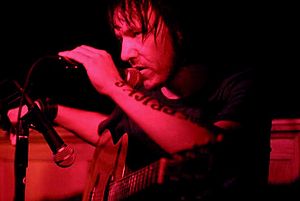
Two sold-out solo acoustic concerts at Hollywood's Henry Fonda Theater, on January 31 and February 1, 2003, saw Smith attempting to reestablish his credibility as a live performer. Before the show, Smith scrawled "Kali – The Destroyer" (the Hindu goddess associated with time and change) in large block letters with permanent ink on his left arm, which was visible to the crowd during the performance. On several songs, he was backed by a stripped-down drum kit played by Robin Peringer (of the band 764-HERO), and members of opening band Rilo Kiley contributed backing vocals to one song. Near the end of the first show, the musician responded for several minutes after a heckler yelled "Get a backbone." Smith played two more Los Angeles concerts during 2003, including The Derby in May and the L.A. Weekly Music Awards in June.
With things improving for Smith after several troubled years, he began experimenting with noise music and worked on his girlfriend Jennifer Chiba's iMac with the intent of learning how to record with computers, noting that it was the only method with which he was still unfamiliar. Smith jokingly labeled his experimental way of recording "The California Frown" (a play on the Beach Boys' "California Sound"). He said of the songs, "They're kind of more noisy with the pitch all distorted. Some are more acoustic, but there aren't too many like that. Lately I've just been making up a lot of noise."
He was also in the process of recording songs for the Thumbsucker soundtrack, including Big Star's "Thirteen" and Cat Stevens's "Trouble". Smith's final show was at Redfest at the University of Utah in Salt Lake City on September 19, 2003. The final song he played live was "Long, Long, Long" by the Beatles.
2004–present: Posthumous releases
From a Basement on the Hill, almost four years in production, was released on October 19, 2004, by ANTI- Records (a part of Epitaph Records). With Smith's family in control of his estate, they chose to bring in Rob Schnapf and Smith's ex-girlfriend Joanna Bolme to sort through the recordings and mix the album. Although Smith had voiced his desire for it to be a double album or a regular album with a bonus disc, it was not clear whether it would have been possible for him to release it that way had he completed it. As completed by Schnapf and Bolme, it was released as a 15-track single album. Many songs from the sessions (later leaked onto the Internet) were not included. There has been unconfirmed speculation that Smith's family made the decision not to include some songs on the record due to their lyrical content, although songs such as "King's Crossing" that deal with darker subjects did make the album.
Elliott Smith and the Big Nothing, a biography by Benjamin Nugent, was rushed to publication shortly after From a Basement on the Hill, shortly after the first anniversary of his death. Smith's family, as well as Joanna Bolme, Jennifer Chiba, Neil Gust, Sam Coomes, and Janet Weiss, all declined to be interviewed. It contained interviews with Rob Schnapf, David McConnell, and Pete Krebs. The book received mixed reviews, with Publishers Weekly remarking that while "Nugent manages to patch together the major beats of Smith's life, he can offer little meaningful insight".
In 2005, a tribute album, A Tribute to Elliott Smith, was released. It featured various bands performing tributes to Smith. On May 8, 2007, a posthumous compilation album, New Moon, was released by Kill Rock Stars. It contained 24 songs recorded by Smith between 1994 and 1997 during his tenure with the label, songs that were not included on albums, as well as a few early versions and previously released B-sides. In the United States, the album debuted at number 24 on the Billboard 200, selling about 24,000 copies in its first week. The record received favorable reviews and was Metacritic's 15th best-reviewed album of 2007. A portion of the proceeds from album sales were to go to Outside In, a social service agency for low-income adults and homeless youth in Portland, Oregon.
On October 25, 2007, a book titled Elliott Smith was released by Autumn de Wilde, which consists of photographs, handwritten lyrics, and "revealing talks with Smith's inner circle". De Wilde was responsible for the Figure 8 sleeve art, making a landmark and de facto Smith memorial of the Solutions Audio mural. A five-song CD featuring previously unreleased live recordings of Smith performing acoustically at Largo in Los Angeles was included in the release.
Following Smith's death, his estate licensed his songs for use in film and television projects such as One Tree Hill, The Girl Next Door, Georgia Rule, and Paranoid Park. In a March 2009 interview, Larry Crane said that Smith's estate was defunct and all rights previously held by Smith are now in the control of his parents. Crane went on to say that his parents own the rights to Smith's high school recordings, some of the Heatmiser material, all solo songs recorded until his 1998 record deal with DreamWorks Records, and From a Basement on the Hill. DreamWorks Records was acquired by Universal Music Group in 2003, and Interscope Records currently "owns all studio and live recording from Jan 1998 to his passing, except for the songs on From a Basement on the Hill."
In December 2009, Kill Rock Stars announced that it had obtained the rights to re-release Roman Candle and From a Basement on the Hill, originally released by Cavity Search and ANTI-, respectively. Roman Candle would be remastered by Larry Crane. Along with the press release, Kill Rock Stars posted a previously unreleased track of Smith's, titled "Cecilia/Amanda", as a free download. Roman Candle and From a Basement on the Hill were re-released on April 6, 2010, in the US.
A greatest hits compilation titled An Introduction to... Elliott Smith was released in November 2010 by Domino Records (UK) and Kill Rock Stars (US).
In August 2013, there was a memorial concert in Portland, Oregon and three other cities. Attending the Portland show were several musicians Smith had performed with, friends, and an appearance by film director Gus Van Sant.
In 2014, the director Paul Thomas Anderson posted a video of the pilot episode for a show called The Jon Brion Show, featuring an acoustic set by Smith including accompaniment by Brion and pianist Brad Mehldau.
On July 17, 2015, a documentary about Smith's life titled Heaven Adores You saw a limited theatrical release. The documentary enlisted a number of close friends and family members, as well as hours of audio interviews throughout Smith's short career. The film was directed by Nickolas Rossi and released through Eagle Rock Entertainment. Heaven Adores You received positive reviews from Consequence of Sound, The Guardian, and The Hollywood Reporter.
On August 6, 2019 (what would have been Smith's 50th birthday), UMe released digital deluxe editions of the two albums XO and Figure 8. The new edition of XO has nine added tracks, including Smith's Oscar-nominated Good Will Hunting song "Miss Misery." Seven tracks have been added to Figure 8. The digital deluxe edition includes "Figure 8"—Smith's cover of the "Schoolhouse Rock!" song—which was originally released only on the Japanese edition of the album. The final track on the new Figure 8 edition is Smith's cover of the Beatles’ "Because", originally featured on the 1999 American Beauty soundtrack. In May 2021, Smith's life and work were the subject of BBC Radio 4's Great Lives.
Death
Smith died on October 21, 2003, at the age of 34 from two stab wounds to the chest.
Smith's remains were cremated, and his ashes were divided between his mother, father, and half-sister Ashley. A small memorial service for family and friends was held at his father's home in Portland, although Smith's "ashes weren't on hand because the coroner wouldn't release them." The status or location of Smith's ashes has not been made public.
Reaction
Shortly after Smith's death, a fan memorial was initiated outside Solutions Audio (4334 Sunset Boulevard, Los Angeles, California), the site at which the cover of the Figure 8 album was shot. Farewell messages to Smith were written on the wall, and flowers, photos, and candles were left. Since then, the wall has been a regular target for graffiti but is regularly restored by fans.
Memorial concerts were held in several cities in the United States and the United Kingdom. A petition was soon put forth with intent to make part of the Silver Lake area a memorial park in Smith's honor. It received over 10,000 signatures, but no plans to establish the park have been announced. A memorial plaque located inside Smith's former high school, Lincoln High, was hung in July 2006. The plaque reads: "I'm never going to know you now, but I'm going to love you anyhow" referencing Smith's song "Waltz No. 2 (XO)".
Since Smith's death, many musical acts have paid him tribute. Songs in tribute to, or about, Smith have been released by Pearl Jam ("Can't Keep" on the Live at Benaroya Hall concert album); Sparta ("Bombs and Us"); Third Eye Blind ("There's No Hurry to Eternity", originally titled "Elliott Smith", on the Live from Nowhere Near You, Volume Two: Pacific Northwest compilation); 9 Horses (“listening to the Elliott Smith discography in reverse order”, on the album Perfectest Herald); Ben Folds ("Late" on Songs for Silverman); Brad Mehldau ("Sky Turning Grey (for Elliott Smith)" on Highway Rider); Rilo Kiley ("It Just Is", and "Ripchord" from the album More Adventurous); Lil B's 'The Worlds Ending'; Rhett Miller ("The Believer" on The Believer); Earlimart ("Heaven Adores You" on Treble and Tremble); Joan As Police Woman ("We Don't Own It" on Real Life); Phoebe Bridgers ("Punisher" on Punisher); and Pete Yorn ("Bandstand in the Sky" on Nightcrawler, a song jointly dedicated to Jeff Buckley). Several tribute albums have also been released since his death, including Christopher O'Riley's 2006 Home to Oblivion: An Elliott Smith Tribute, with 18 instrumental covers, The Portland Cello Project's 2014 to e.s., covering six of his songs, Seth Avett and Jessica Lea Mayfield's 2015 Seth Avett and Jessica Lea Mayfield Sing Elliott Smith, with 12 covers incorporating Smith's musical style and their own, and To Elliott, from Portland containing covers by a number of Portland bands.
Musical style and influences
Smith respected and was inspired by many artists and styles, including the Beatles, Big Star, the Clash, the Who, Led Zeppelin, the Kinks, Pink Floyd, Rush, Bauhaus, Elvis Costello, Oasis, Television, Motown and flamenco records, AC/DC, Hank Williams, and Scorpions, Smith claimed to listen exclusively to selected albums (such as The Marble Index by Nico) for months. Sean Croghan, a former roommate of Smith's, said that Smith "listened almost exclusively to slow jams" in his senior year at college. Smith also took inspiration from novels, religion, and philosophy. He liked classic literature, especially Samuel Beckett, T. S. Eliot, and Russian novelists such as Fyodor Dostoyevsky.
Smith mentioned his admiration for Bob Dylan in several interviews, citing him as an early influence. He once commented: "My father taught me how to play 'Don't Think Twice, It's All Right'. I love Dylan's words, but even more than that, I love the fact that he loves words." Smith covered Dylan's "When I Paint My Masterpiece" several times in concert. Smith has also been compared to folk singer Nick Drake, due to his fingerpicking style and vocals. Darryl Cater of AllMusic called references to "the definitive folk loner" Drake "inevitable", and Smith's lyrics have been compared to those in Drake's minimalist and haunting final album.
Smith was a dedicated fan of the Beatles (as well as their solo projects), once noting that he had been listening to them frequently since he was about "four years old" and also claimed that hearing The White Album was his original inspiration to become a musician. In 1998, Smith contributed a cover of the Beatles song "Because" to the closing credits and soundtrack of the film American Beauty. Although this was the only Beatles song that Smith ever officially released, he is known to have recorded many others, ("Revolution", "I'll Be Back" and "I'm So Tired") and played many songs by both the band and the members' solo projects at live concerts.
Smith said that transitions were his favorite part of songs and that he preferred to write broader, more impressionistic music closer to pop rather than folk music. Smith compared his songs to stories or dreams, not purely confessional pieces that people could relate to. When asked about the dark nature of his songwriting and the cult following he was gaining, Smith said he felt it was merely a product of his writing songs that were strongly meaningful to him rather than anything contrived. Larry Crane, Smith's posthumous archivist, has said that he was surprised at the amount of "recycling of musical ideas" he encountered while cataloging Smith's private tapes: "I found songs recorded in high school reworked 15 years on. Lyrics became more important to him as he became older, and more time was spent working on them."
Legacy
Since his death, Smith has been regarded as one of the most influential artists in indie music. Many artists have mentioned Smith as their influence, such as Frank Ocean, Beck, Phoebe Bridgers, Julien Baker, and Haim's lead vocalist Danielle Haim.
Discography
- Roman Candle (1994)
- Elliott Smith (1995)
- Either/Or (1997)
- XO (1998)
- Figure 8 (2000)
Posthumous studio albums
- From a Basement on the Hill (2004)
Compilation albums
- New Moon (2007)
See also
 In Spanish: Elliott Smith para niños
In Spanish: Elliott Smith para niños


